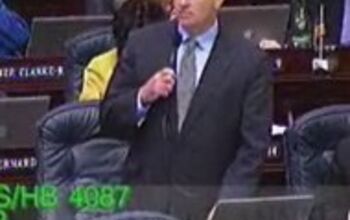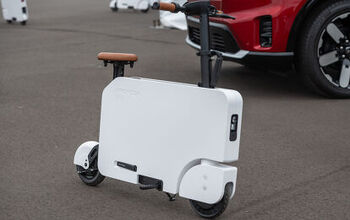California, Washington: Residents To Vote On Banning Red Light Cameras
Residents of Mukilteo, Washington and Anaheim, California will vote this November on whether to ban red light cameras and speed cameras. Washington initiative guru Tim Eyman joined representatives from BanCams.com and the Campaign for Liberty yesterday in announcing that the required number of signatures had been collected to force an anti-camera initiative onto the next ballot. A total of 1909 signed in a matter of just two weeks.
“We’ve shattered the Mukilteo record on the fastest amount of time gathering signatures,” Eyman told TheNewspaper jokingly.
The city has had only one other successful initiative petition, but Eyman credits the speed of collection to the strength of Initiative Petition No. 2’s message, namely that voters should decide whether or not to ban automated enforcement ( view initiative). Eyman hopes to have the petition certified and brought before the city council in time for its next meeting on June 21.
Eyman pointed out that Councilman Kevin Stoltz provided the 1909th signature on the petition. Stoltz had been out of town when Mayor Joe Marine cast the deciding vote to enact a red light camera ordinance. Had Stoltz been present, the motion would have failed. Initiative organizers plan to continue going door-to-door to collect more signatures and educate the public about their measure.
No signatures were needed in Anaheim as Mayor Curt Pringle pushed a city charter amendment banning red light cameras onto the November 2 ballot with the unanimous support of his colleagues on Tuesday.
“Neither the city council, nor any officer or employee of the city when acting in his or her official capacity, shall take any action which would directly or indirectly result in the authorization, approval or installation of any red light camera or other automated traffic enforcement system in the city of Anaheim,” the proposed charter amendment states.
Anaheim has no red light cameras, but Pringle wants to make sure that no future city administration attempts to install them without public consent after he steps down at the end of the year.
“I believe many red light cameras that are placed around this county or around the state are done for the purpose of local government’s revenue collection as opposed to traffic safety,” Pringle explained in April.
While ten cities have enacted similar initiatives prohibiting automated ticketing machines, Anaheim’s would be the first placed on the ballot at the request of a city council. Once on the ballot, no photo enforcement program has ever survived a public vote. The full text of the Anaheim initiative is available in a 45k PDF file at the source link below.
Proposed amendment: Measure No. 1 – Red light cameras (City of Anaheim, California, 6/10/2010)
[Courtesy: Thenewspaper.com]
More by The Newspaper
Latest Car Reviews
Read moreLatest Product Reviews
Read moreRecent Comments
- Jrhurren Worked in Detroit 18 years, live 20 minutes away. Ren Cen is a gem, but a very terrible design inside. I’m surprised GM stuck it out as long as they did there.
- Carson D I thought that this was going to be a comparison of BFGoodrich's different truck tires.
- Tassos Jong-iL North Korea is saving pokemon cards and amibos to buy GM in 10 years, we hope.
- Formula m Same as Ford, withholding billions in development because they want to rearrange the furniture.
- EV-Guy I would care more about the Detroit downtown core. Who else would possibly be able to occupy this space? GM bought this complex - correct? If they can't fill it, how do they find tenants that can? Is the plan to just tear it down and sell to developers?


































Comments
Join the conversation
Tim Eyman is a big trouble maker up here. And the only place I'm aware of in Mukilteo where they were going to put in a speed camera is right by a school where a lot of motorists speed. The road adjacent to the school sees a lot of traffic from the Whidbey Island ferry dock and if you ask me, there NEEDS to be a speed camera there. This is one of those rare times where I am all for automated traffic enforcement.
Yeah, that Eyman guy is real troublemaker. He keeps getting initiatives on the ballot that force the legislature to ask permission of the voters before raising taxes. Fundamentally evil. Oh, the road by Olympic View MS could have cop by it the two times a day that is necessary. And cops are all over the place during the weekend when traffic is the heaviest. But, to catch that guy going by at 10 over at 1:00am when no one is around? Cameras! Revenue! Whoopee! Just think how much money we could raise if we had cameras everywhere!